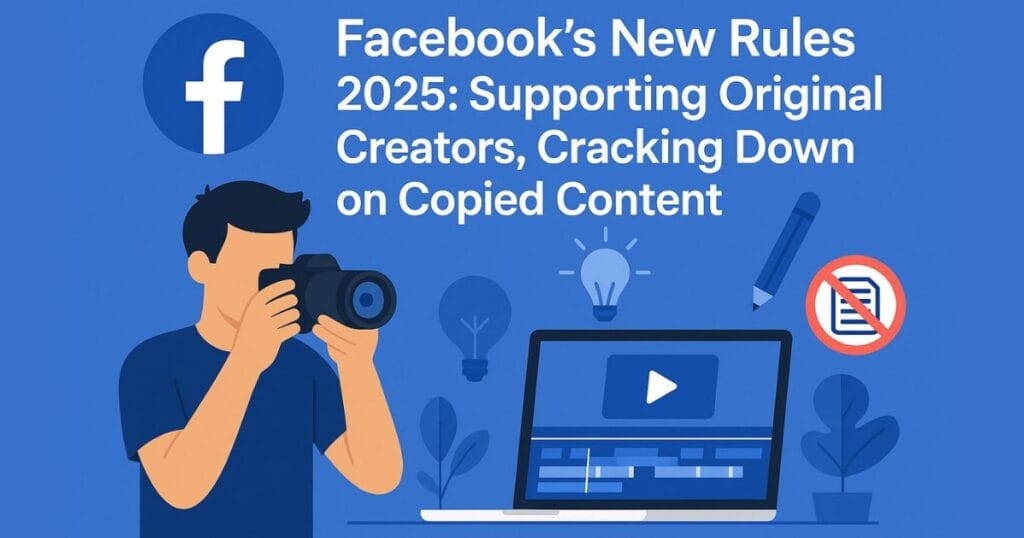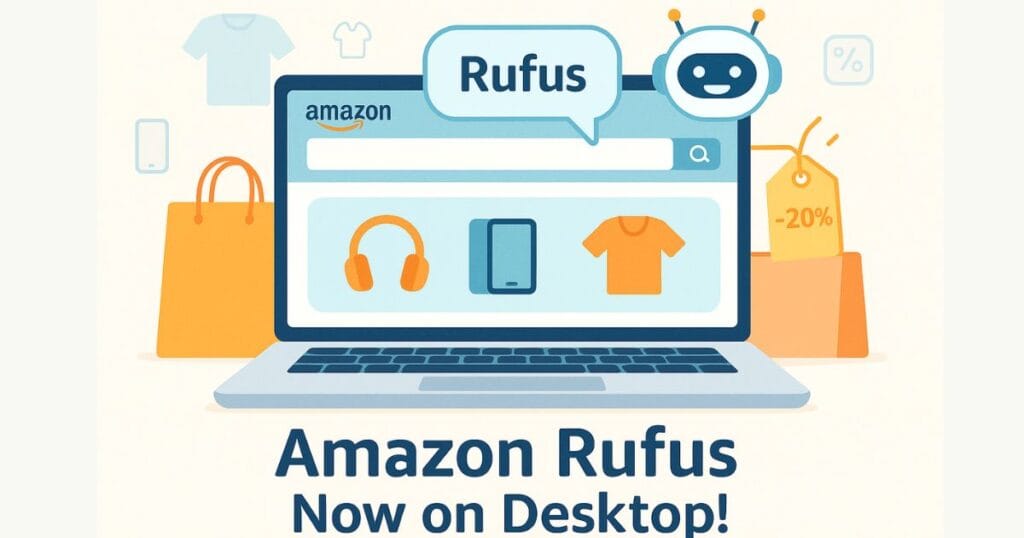Facebook has recently implemented new rules designed to promote original creators while reducing copied content. If you work hard to create videos, photos, or articles on Facebook, these rules could be good news for you. On July 17, 2025, Meta (Facebook’s parent company) announced these rules with the aim of making Facebook a platform where authentic and fresh content is more visible.

In this article, we will explain these rules in simple terms, how they will work, and what impact they will have on creators and regular users. We will also share tips to help you take advantage of these rules to increase your post reach.
Why Did Facebook Introduce These New Rules?
Nowadays, many people on Facebook copy others’ content—such as videos, photos, or written posts—without permission. This harms those who work hard to create something new, as their posts get less visibility and fewer opportunities for followers or earnings.
Meta observed that some people were using AI (computer programs) to quickly post copied content, referred to as “AI slop.” This is low-quality, thoughtless content that lowers Facebook’s overall quality.
To address these issues, Meta introduced new rules in 2025 with the goals of:
- Providing more support to original creators.
- Reducing the visibility of copied content.
- Promoting new and engaging content on Facebook.
What Are Facebook’s New Rules?
Meta has implemented straightforward yet strict rules to reduce copied content and benefit original creators on Facebook. Here’s a breakdown:
Penalties for Copying Content
If someone repeatedly posts others’ videos, photos, or posts without permission, they will face penalties, including:
- Reduced reach, meaning their posts will appear less in the News Feed.
- Loss of monetization opportunities on Facebook, such as ad revenue.
For example, Meta took action against nearly 500,000 accounts in 2025 that were posting fake or spammy content, demonstrating the company’s seriousness about this issue.
Reduced Reach for Copied Videos
If a video is identified as copied, this will show it to fewer people. This will help the original creator’s video reach more viewers, resulting in more likes, shares, and followers for creators who invest effort into unique content.
Full Credit to Original Creators
Meta is testing a new feature that will add a link to copied videos, directing viewers to the original video. This helps audiences know who the real creator is and supports them directly.
Special Tips for Creators
It has provided simple advice for creators to increase reach and avoid penalties:
- Create your own content: Always post your original videos, photos, or stories to get better reach.
- Add unique value: If you use someone else’s content, add your voice, commentary, or a new perspective instead of simply copy-pasting.
- Avoid watermarks: Remove logos from apps like TikTok or YouTube, or your posts may get less reach.
- Write clear captions: Use clean, simple captions, avoid using more than five hashtags, and limit unnecessary links.
What Will Be the Impact of These Rules?
Benefits for Creators:
- Increased Reach: Original creators’ posts will reach more people, helping them gain followers and earn more.
- Better Credit: With links on copied videos, original creators will receive proper recognition.
- Cleaner Environment: Low-quality, fake content will decrease, allowing high-quality posts to shine.
Potential Challenges:
- Risk of False Penalties: Meta uses AI to detect copied content, which may sometimes incorrectly penalize genuine creators. Some users have reported wrongful account suspensions.
- Changes in User Experience: With less copied content, some users might see less of what they like, but Meta clarifies that adding commentary or personal touch to shared content will prevent issues.
- AI Content Confusion: AI-generated content is allowed if it’s new and original, but the definition of “original” may still cause confusion.
How to Follow Facebook’s Rules?
If you want to increase your post reach on Facebook, follow these tips:
- Create original content: Produce your own stories, videos, or photos to build your brand.
- Add a unique perspective: Add your voice, humor, or commentary when sharing others’ content to avoid being flagged as a copy.
- Focus on quality: Use clear videos, good images, and engaging captions to attract viewers.
- Use the Professional Dashboard: Track your post-performance and fix any issues promptly using its professional tools.
Meta’s Previous Actions
Meta has already been working to curb harmful content on Facebook:
- In 2025, action was taken against 500,000 accounts posting fake or spam content.
- Over 10 million fake profiles mimicking large creators were removed.
- According to Meta, 3% of Facebook users were fake accounts, and over 1 billion fake accounts were addressed between January and March 2025.
READ META OFFICIAL BLOG ABOUT NEW RULES
ALSO READ- Facebook’s New Photo Scanning Feature: What It Means for Your Privacy (2025 Update)
Facebook vs. YouTube
Its new rules are somewhat similar to YouTube’s recent policies, which restrict repetitive or AI-generated videos. However, Facebook’s approach differs by not completely banning AI-generated content, instead encouraging creators to showcase their effort and creativity, leading to more engaging, fresh content on the platform.
Conclusion
Its new rules in 2025 present a major opportunity for creators. If you create unique, fresh content with effort, your posts will reach a wider audience, allowing you to gain more followers and earn more. However, those who copy others’ content will face penalties such as reduced visibility and loss of monetization opportunities.
This move by Meta aims to improve Facebook, making it a place where fresh, quality content stands out. If you are a creator, follow these rules, create original content, and use the professional dashboard to track your growth.
What are Facebook’s new rules in 2025 about?
Facebook’s new rules focus on supporting original creators by increasing the reach of their content while reducing the visibility of copied or low-quality content. They also penalize repeated content copying with reduced reach and demonetization.
Will AI-generated content be banned on Facebook?
No, Facebook is not banning AI-generated content outright. However, the content should be original, valuable, and not just repetitive “AI slop.” Adding your unique voice, commentary, or creative approach will help your content stay compliant.
What happens if I share someone else’s video on Facebook?
If you share someone else’s video without permission or transformative input, Facebook may reduce the reach of your post. However, if you add your commentary, voice-over, or unique perspective, it may not be flagged as copied content.


